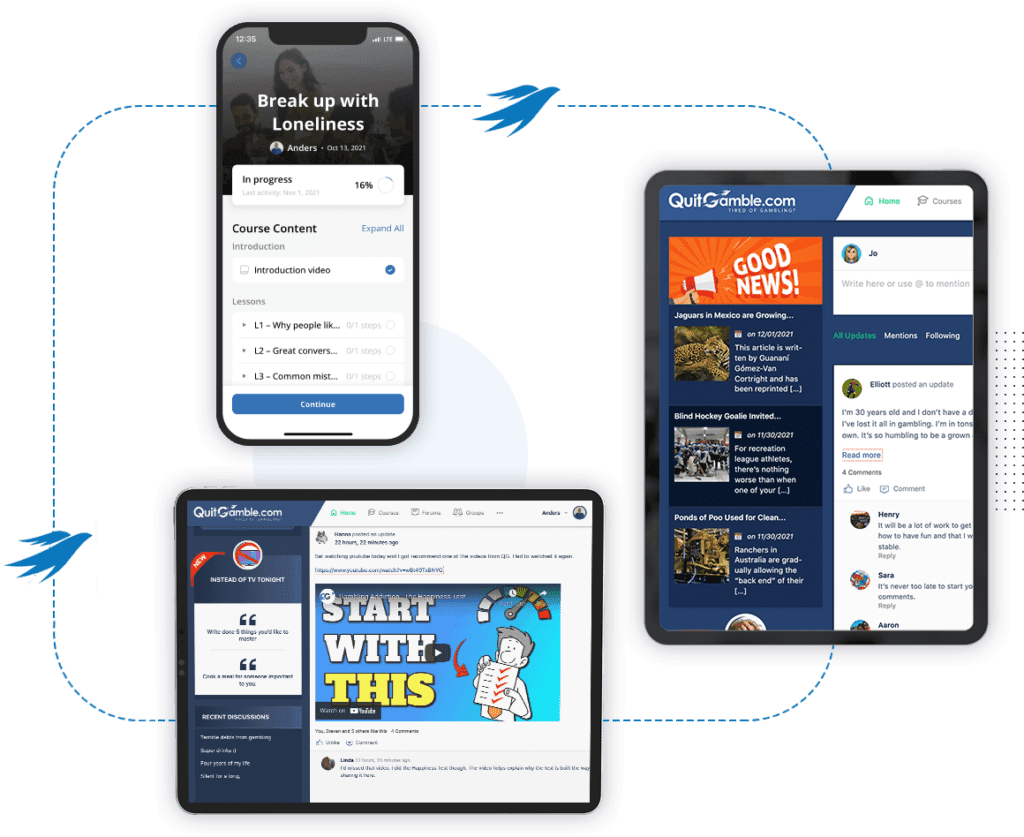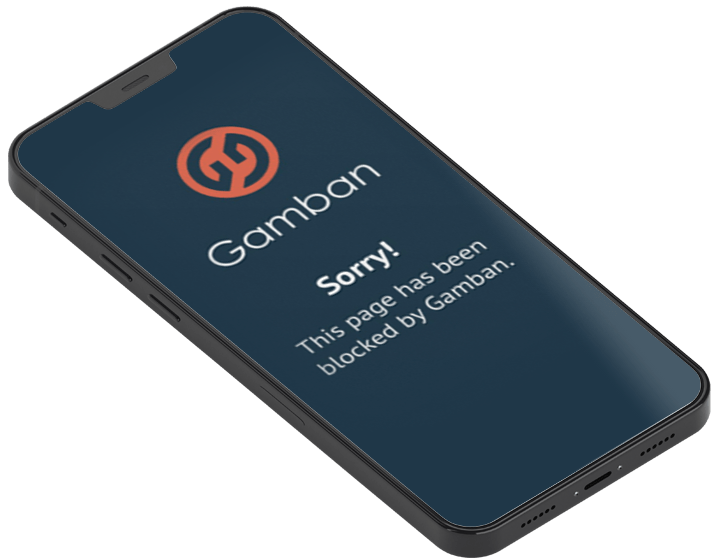How to stop Gambling Massachusetts
Looking for support to overcome your gambling addiction in Massachusetts? Let’s get you started with this helpful guide.
- Available Gambling help MA
- Tips to stop gambling Massachusetts
- Ideas, Trix and Self-Exclusion
If you live in any other US state,
select a state to find your state guide.
Select a State
Let’s Get Started
Gambling can be as enticing as ice cream – and extremely challenging to resist when it’s right in front of you. Decreasing your exposure to gambling triggers lowers the risk of a gambling relapse. Our video course, ‘How to create a Change Plan‘ offers helpful guidance on this transition. Here are some actionable steps that can help:
- Switch Email address
- Switch Cellphone number
- Switch to streaming services – Avoid watching TV channels with gambling commercials.
- Clean up physical space – Uninstall any apps or programs related to gambling.
By taking these preventive measures, you can start creating a healthier relationship with gambling and work towards becoming gambling free.

How to decrease your exposure to gambling ads?



Gambling Support In Massachusetts
As a compulsive gambler in Massachusetts, here are some more resources that can be helpful.
- QuitGamble.com (We challenge you to challenge yourself)
- Gambler’s Anonymous Massachusetts (Classic 12-steps, or read QG vs. GA)
- Massachusetts Association on Problem and Compulsive Gambling
- Suicidal thoughts? Please Call National Suicide Prevention Hotline at 1-800-273-8255.
Gambling can have severe consequences for individuals and their families. Fortunately, Massachusetts has many support options for those struggling with problem gambling. Gamblers Anonymous MA is one such option; it provides a safe environment for people to share experiences, strength, and hope to overcome the difficulties associated with compulsive gambling.
The Problem Gambling Helpline 1-800-GAM-1234 is another valuable resource; this free service offers confidential advice and referrals to treatment services.
Additionally, the Department of Public Health – provides information about local resources, prevention strategies, and research related to problem gambling in Massachusetts. With these supports and more, there are plenty of opportunities for anyone looking for help with their problems or just wanting to learn more about how to stop gambling in the state. Suppose you’re gambling in Massachusetts and want to quit. It’s important to know that help is also available in neighboring states. Connecticut, Maine, Vermont, New York, and New Hampshire all have resources for problem gambling, including hotlines, support groups, and counseling services.
QuitGamble.com – Online Gambling Support
QuitGamble.com is an online social network that provides support for problem gamblers around the world. The platform offers a modern, 24/7 approach to addressing the cause of addiction and provides various tools:

- Community connecting over 3,500 users worldwide.
- Animated video courses to beat addiction
- Vivid guides with educational videos
- Forum, support groups, emails & chat services
- Mobile App / Desktop
QuitGamble.com is free and open 24/7. You’re not alone anymore, in the community, you can befriend people in the same situation as you.
Let’s Kick Addiction’s Ass!
Massachusetts Council On Compulsive Gambling
The Massachusetts Council on Gaming and Health (MACGH) is a statewide non-profit agency that works to mitigate the negative impacts of gambling and gaming. For those struggling with gambling, there are many resources available for support. MACGH provides free, confidential help for problem gambling through the Substance Use Helpline at 1-800-327-5050. GameSense Advisors are available 24/7 via LiveChat at MACGH.org or by calling the gambling helpline at 1-800-GAM-1234.
For individuals wanting to take a break from gambling, the Voluntary Self-Exclusion Program offers an opportunity to remove themselves from gaming floors and marketing lists for a while:
- Enrollment can be done remotely or in person.
- VSE enrollment is accessible in multiple languages.
- During exclusion terms, any on-site gambling automatically forfeits all wagers, losses, and winnings.
- Since its inception in 1983, the Mass. Council has taken a neutral stance on legal gambling and gaming.
These programs provide valuable resources for anyone looking to manage their gambling habits. The Massachusetts Council on Gaming and Health is dedicated to improving public health and helping those in need.
Gamblers Anonymous Massachusetts
Massachusetts residents have access to resources and support groups like Gamblers Anonymous MA. GA is an organization that can help those affected by compulsive gambling find recovery through fellowship with other gamblers striving to abstain from addiction.
To get started, individuals should call the Massachusetts Council on Compulsive gambling’s 24/7 confidential helpline at 1-800-GAM-1234 or visit their website. The helpline provides free information about how to stop gambling and referral services to treatment centers across the state. From there, individuals can search online or inquire directly with the MCCG staff regarding local chapters of Gamblers Anonymous meetings throughout Massachusetts.
At each meeting, members exchange experiences and stories that illustrate life before accessing help and then discuss techniques used to remain abstinent while attending. It’s also beneficial for participants to network with others who may be able to provide advice based on personal experience when dealing with challenges related to problem gambling. In addition to these benefits, many states offer special programs and initiatives funded by the National Council on Problem Gambling dedicated to providing problem gambler treatment services and prevention education programs statewide.
Self-Exclusion In Massachusetts
The Massachusetts Voluntary Self-Exclusion Program allows individuals to limit their gambling opportunities. This program allows participants to block themselves from entering any casino regulated by the Massachusetts Gaming Commission for periods of one, two, three, or five years, or even a lifetime if desired.
Here are some of the benefits of this program:
- Prohibits access to gaming floors in casinos
- Prevents use of ATMs at different casinos around the country
- Provides an avenue to regain control over your life
- If you’d like to sign up for the Massachusetts Voluntary Self-Exclusion Program, please contact the MGC via phone (617.533.9737) or email (vse@massgaming.gov).
Further information about the program can be found online. Participation in the program is voluntary and provides an effective way to manage recreational gambling activities.

Do You Gamble Online In Massachusetts?
Massachusetts has currently prohibited all online gambling. This lack of regulations can make it hard for people who have a problem with compulsive gambling. The Gamban app is a great tool to help gamblers avoid online casinos.
Gamban helps by blocking access to any website related to gambling in Massachusetts and other places. Furthermore, users cannot uninstall the app until their subscription runs out. Here are a few key points to consider:
- According to recent studies, more than two million adults in the US problematically gambled on internet games in 2019.
- Gamban works on desktops, iPhones, and Androids, so anyone can download it directly through an app store or visit Gamban.com.
- Even though Gamban isn’t the solution, it assists when someone is urged to gamble.
If you are looking for a way to protect yourself from online gambling, Gamban should be your go-to option. It will help you take control of your habits as well as save money and time.
Help A Gambling Addict In Massachusetts
If you know someone struggling with compulsive gambling, many resources are available to help. It’s not uncommon for relatives of an addict to become co-dependent on their behavior. QuitGamble.com offers a chat and forum where individuals can ask questions and seek advice from ex-compulsive gamblers and those in the same situation. If you are looking for ways to protect yourself and handle the case, a guide on 21 steps to take when dealing with a gambling spouse can be found online.
To better understand how to cope with a loved one’s addiction, these three key points should be taken into consideration:
- Learn to recognize signs of problem gambling
- Avoid becoming too heavily reliant on the gambler
- Utilize nonviolent communication techniques
These tools will equip you to speak up, prevent codependency, and create an action plan to deal with the issue. In addition, videos related to the topic can also provide helpful information. By taking advantage of all the helpful resources out there, ultimately, you can become the hero of your own story.
Helping a gambling addict in Massachusetts can be difficult, but it is not impossible. The first step to helping someone with a gambling addiction is understanding the scope of the problem and recognizing the signs of an issue. Gambling problems often involve more than just financial losses; they can also include issues such as depression, anxiety, social isolation, and other mental health concerns. Family members must act if they suspect someone close to them may have a gambling problem.
It’s important to remember that recovery from symptoms of gambling addiction takes time and dedication from the individual facing the issue and their family members supporting them through this process. When necessary, connecting with support groups, educational materials, and professional assistance can make addressing a loved one’s compulsive behavior possible.
Let’s stop Gambling Massachusetts
If you feel like your gambling habits may have become an unhealthy part of your life, there are resources available that can help you quit or cut down on your losses. You don’t have to go through this alone; talking to someone about it can make all the difference. I hope this article has been informative and provided insight into what help is available to stop gambling in Massachusetts.
 English
English Español
Español Français
Français Português
Português Svenska
Svenska
